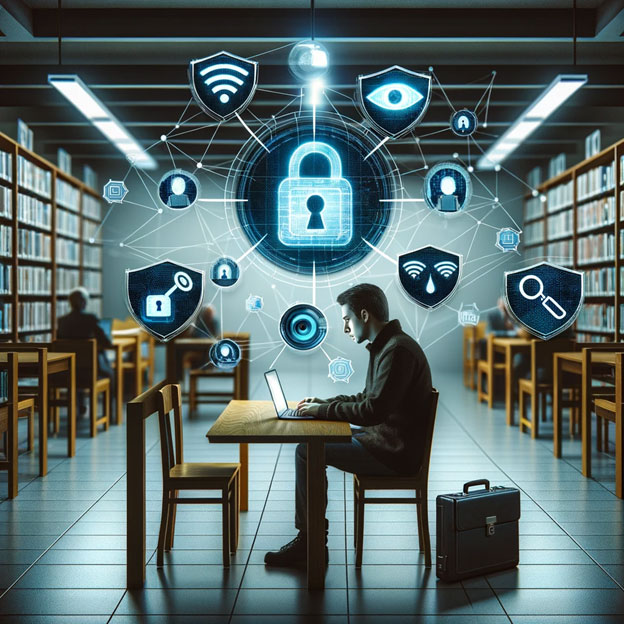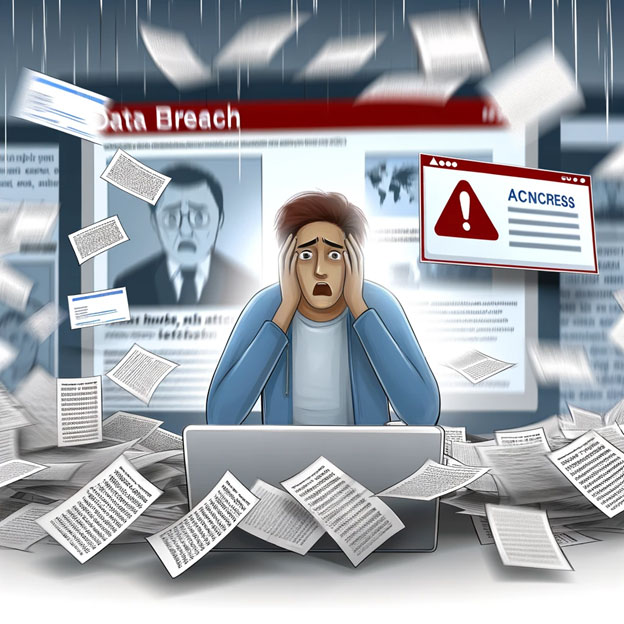
It Can Happen to You: Protecting Your Personal Data
Identity theft seems like it can never happen to you — but it does happen to real people every day. It affected more than a million consumers in 2023, according to the Federal Trade Commission.
At its core, identity theft happens when your personal (or business) data is shared in some way — either by you accidentally or through a data breach. To protect yourself from identity theft — both personal and business — the most important step you can take is to safeguard your personal information.
While we’ll primarily address personal data here, be aware that all the same missteps and best practices can apply to your business as well. A chain is only as strong as its weakest link, so ensuring your employees are protecting their own personal data — and your business’s — can save you from disaster.

How does your personal information get out, anyway?
Your personal data is being collected all the time, unfortunately. You drop it bit by bit, like a digital trail of crumbs behind you. Though each individual bit of data might not seem like a big deal on its own, a criminal can easily put together a few clues to steal your identity or harm your business.
When you use websites and apps and provide data like your name, address, telephone number, email address, and birth date, you often agree to let that company sell your data to other companies or share it with affiliated companies. And even if you haven’t agreed to share that data, the app or site can be hacked, exposing your information.
But there are many other ways your data trickles out, including:
- Public records: For example, data such as property ownership, available through your county’s website, can reveal your name, address, spouse’s name, photos of your home, and where your children attend school, giving criminals a lot to work with.
- The dark web: This is an ugly corner of the internet where criminals can buy and sell Personally Identifiable Information like credit card numbers, Social Security numbers, and account login information.
- Social media: It’s no secret that people overshare on social media, and you can inadvertently include private data in your posts and photos. In the name of a fun game, people often unwittingly post their first pet’s name or high school mascot – common answers to security questions for financial and medical websites.
- Public Wi-Fi: Logging into websites in a public space like a coffee shop, airport, or library can be very risky. Crafty criminals have several methods they use to grab the info you’re typing into your device when using public Wi-Fi, exposing everything you’re doing – from work to online shopping to logging into your bank account.
- ChatGPT: People are using this popular generative AI system to do all sorts of things, including draft legal documents, self-diagnose medical conditions, and analyze large batches of data or text. While this tool has its uses, it’s absolutely crucial to never feed it personal data. Breaches over the last year have revealed some users’ usernames and passwords, payment data, and chat history.
For businesses, that last part is particularly important. To create presentations or reports or review code, some employees have accidentally given ChatGPT access to their company’s proprietary information. This happened to Samsung in 2023, leading other companies like Apple to ban its employees from using ChatGPT. You’d be wise to enact a similar ban in your business.
How to reduce the amount of personal information about you online
The first step in preventing your personal information from being shared across the web is to stop doing some of the things we’ve mentioned above. The next step is to try to get your personal data removed in as many places as possible.
One resource we recommend at Cenetric is Optery, which has both personal and business plans. (This is not an ad or paid link – we just really like it!) Services like Optery can remove your data from people search sites, helping you reduce your digital footprint.
Next, make sure you’re protected when using public Wi-Fi. Use an anonymizer VPN to keep prying eyes away when you’re using a public network, and use a remote access VPN to let employees into your business systems. Each serves a different purpose, but both are vital.

Has your personal info been compromised already?
You can check if your email addresses have been exposed in breaches, putting criminals one step closer to accessing important accounts. Check your email addresses at haveibeenpwned.com to find out which data breaches your information has been compromised in — and then be sure to change your account password right away.
Let Cenetric guide your business to safety
No matter what business you’re in, cybersecurity is an important part of your strategy. From protecting customer data to warding off phishing attempts, safeguarding your systems is a must. With strategies like proper password management, cybersecurity insurance, and remote work protections in place, you can rest easier knowing your business and your employees are protected.
Cenetric experts are here to help you make sense of it all, identify the highest security priorities and put the right protections in place for your business. We have the experience to get — and keep — you covered when it comes to cybersecurity. Let’s talk about your needs today.

